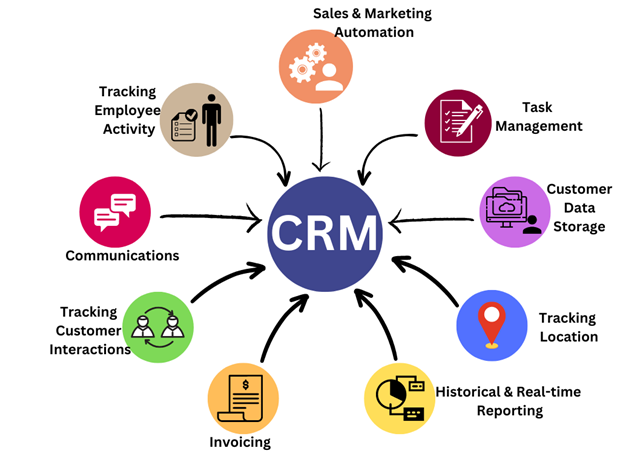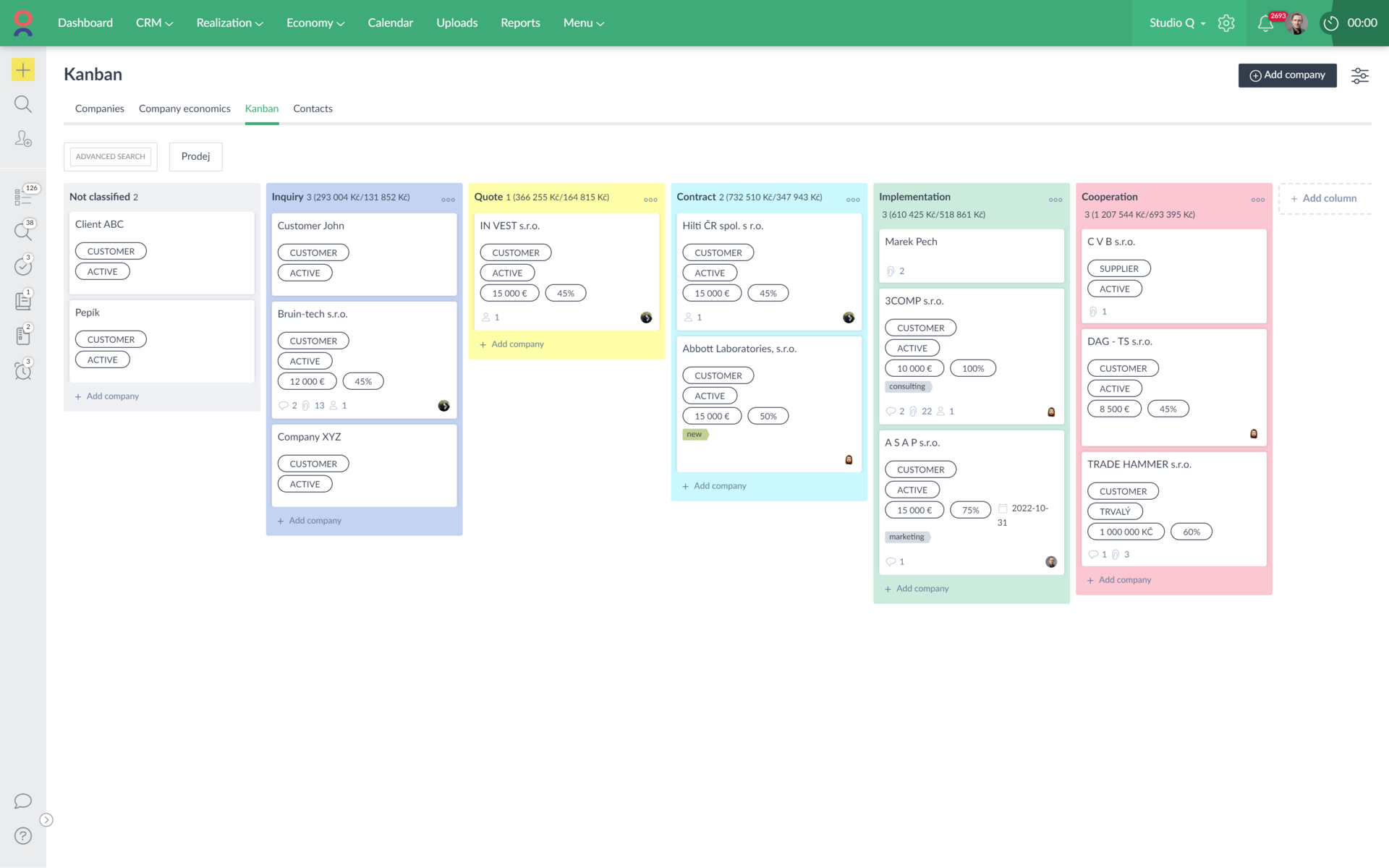Customers are the lifeblood of your business. It’s long established that a 5% increase in customer retention leads to a 25-95% increase in profits, which has made providing outstanding customer experiences a top priority. As a result, CRM solutions have turned into a go-to for businesses of all sizes and an essential management tool for every small business.
🎓 CAFLOU® academy is brought to you by CAFLOU® - 100% digital business management software

With a CRM system in place, it’s easier to keep track of your customers and their needs. You can also understand the buyer’s journey better, which leads to higher conversion rates and more sales. And these are just some of the benefits that CRM solutions can bring to your business. It doesn’t come as a surprise that more than a third of sales organizations globally have already implemented the full capacity and functionalities of this modern technology.
Whether you're a small business owner or the CEO of a large corporation, understanding the importance of CRM is vital for survival and success in today's fast-paced and overcrowded business environment. In this article, you’ll learn everything you need to know about CRM systems, including why businesses use them, who can benefit from them, and what to look for in a CRM solution.
First things first.
What is a CRM System?
Customer relationship management (CRM) is a software-based system that businesses use to manage interactions with customers and prospects. On the one hand, you can think of such solutions as a digital hub concentrating all your customer-related information, such as customer data, sales history, customer service interactions, and customer feedback. The figure below illustrates the various aspects and elements of CRM.

Elements of modern CRM
However, a CRM system is much more than convenient and well-organized data storage. It’s a tool that offers automation, tracking, and reporting functionalities. Whether you’re in the B2B or B2C sector, you can take advantage of a CRM system to streamline the management of customers.
Why do businesses use CRM?
We’ve already touched upon some of the reasons why businesses opt for CRM. Let’s delve into more details now.
What is the goal of implementing CRM?
With the ever-increasing competition, businesses should have a strong relationship with their customers to stay ahead in the game. This is where CRM systems come into play and empower organizations:
To improve the interactions and relationships between a business and its customers
Did you know that almost two-thirds of consumers expect to receive personalized service as a standard? By having a centralized database of customer information, businesses can gain valuable insights into their customer's needs, allowing them to provide more meaningful communication, more personalized relations, and more effective support.
To increase customer satisfaction, loyalty, and revenue
By using CRM to track and analyze customer interactions and behaviors, businesses can gain a better understanding of what their customers need and expect. This information can then be used to improve customer engagement and experience, leading to enhanced customer satisfaction and loyalty. This directly translates into an increase in revenue as satisfied and loyal customers are likely to spend more and purchase more often from their favorite brand.
To create a centralized, comprehensive, and up-to-date database of customer information
This database serves as a single source of truth for all customer interactions and data, making it easier for businesses to keep a complete and current track of important information. The centralized nature of the CRM database also helps ensure that all customer data and updates are consistent across departments and teams, resulting in a seamless and effective customer support process. By having access to accurate, up-to-date customer information, businesses can make better-informed decisions, enhance the overall customer experience, and ultimately drive increased customer satisfaction and loyalty.
What are the benefits of using CRM?
Let’s summarize the advantages a CRM solution can bring to an organization.
- Improved customer experience due to the availability of all the relevant and up-to-date data across all platforms and departments
- Improved customer insights allowing businesses to understand their customers' needs and preferences
- Streamlined sales and marketing efforts due to the readily accessible and well-organized customer data that makes it easy to target and tailor campaigns
- Increased customer retention and loyalty resulting from delivering improved and smooth experiences with the brand
- Enhanced collaboration brought about by the centralized database of customer information that is accessible to all team members
- Improved decision-making due to the readily structured data and customer insights
All of these benefits ultimately drive better business outcomes and contribute to the overall success of the organization. Now that you know what a CRM system is and why it’s important, you might be asking yourself if this is your cup of tea.
Do you need CRM?
As businesses navigate through the ever-evolving landscapes of customer expectations and demands, it's essential to understand the role of CRM in building and maintaining relationships with customers.
Who can benefit from CRM?
Both small businesses and large enterprises can take advantage of a CRM system. For a large enterprise with a complex organization and a multitude of customers, this is the only way to keep all interactions and operations on track and under control. A small business with a lean team, on the other hand, will be able to manage customer operations more effectively, avoiding the need to increase the number of customer service reps.
Moreover, CRM solutions vary in their complexity and range of capabilities, so there are different options designed to meet the specific needs of organizations of different sizes, types of products or services offered, and target customer bases. There are simple solutions with basic functionalities, such as Pipedrive, intended for small businesses that don’t need the extensive features of more complex systems. Also, there are options that are particularly suitable for specific industries, like monday.com, which is designed with marketing teams in mind and focuses on collaboration and keeping everyone on the same page. More sophisticated solutions and business management systems, such as Caflou, combine CRM with project management, financial and cash-flow management, time management, and automation to enable users to take full control over their customer relations and service operations.
CRM is particularly valuable and helpful if you operate in:
- IT Services: IT businesses use CRM to automate sales operations, ensure better customer support, and increase customer lifetime value. CRM solutions are vital for ensuring customer success as they can accelerate product adoption by offering personalized experiences and interactions. In this way, such systems reduce churn and increase profitability.
- Marketing agencies: Marketing agencies offer a wide variety of services to their clients. A full-fledged CRM solution can help manage the entire portfolio of activities for each client, including business details, projects, tasks, invoicing and much more.
- Professional services: A CRM tool enables professional services providers to keep track of, manage, and automate clients’ past and current projects.
- Building and construction: With a CRM system, construction companies are able to offer their clients a transparent picture of their project status, timelines, or past and forthcoming expenses.
- B2B Sales: B2B companies can use CRM to manage their sales pipelines and track customer interactions, which helps increase sales efficiency and close more deals.
- Retail: A retail company can use CRM to track customer purchases and preferences, allowing for personalized marketing and product recommendations.
- Healthcare: A healthcare provider can use CRM to manage patient information and appointments, streamlining the patient experience and improving communication between healthcare providers and patients.
These are just a few examples, and the specific applications of CRM can vary greatly based on the needs of the individual organization.
Who doesn't need CRM (and why)
Only very small businesses with an extremely low volume of customers may not need a CRM system. In this case, the business owners could maintain personal relationships with each customer and a good understanding of their needs without a comprehensive system.
What to look for in a CRM solution
Looking at the functionalities of a CRM system before choosing the best option for you can save you from unnecessary spending and headaches.
What are the key features of CRM?
No matter how simple or complex it is, every CRM integrates the following features
- Contact management: A CRM solution keeps track of customer information, interactions, and relationships in a centralized database. For instance, the CRM feature offered by Caflou enables users to organize and visualize all the important customer-related data in a convenient and clear way. You can easily see the business status and phase, the employee responsible for the particular client, the specific role of the company, its location, and other relevant information.

- Lead management: With a CRM system, businesses can identify and track potential customers to turn them into paying customers.
- Sales management: CRM streamlines the sales process and helps sales teams manage deals, pipelines, and forecast sales.
- Analytics and reporting: Provides insights into customer behavior, sales performance, and business trends to inform data-driven decision-making.
- Customer service: Enhances customer engagement and satisfaction by providing a centralized platform for customer support and service. In the image below, you can look at the detailed information that helps your service team access all data available about every customer. Equipped with this information, your team is able to ensure impeccable customer support.
Now that we’ve discussed the basic features all CRM solutions share, let’s look at the cutting-edge functionalities you can opt for.
What bonus features does CRM offer?
In addition to these key functionalities related to storing and using customer data to optimize operations, modern CRM solutions come with additional bonus features, such as:
- Automation, which streamlines marketing and sales operations and automates repetitive tasks, allowing businesses to focus their efforts on more critical aspects of their operations. This allows users to utilize intelligent planning and task organization, increase productivity, improve time management, and minimize errors.
- Integrations, which enable businesses to seamlessly integrate their CRM with other tools and systems they use, eliminating the need for manual data transfer and reducing the risk of errors.
Takeaway: CRM in 2023 and beyond
Not only does a CRM system provide reliable and readily accessible storage of your well-organized customer data, but it can also automate sales and marketing processes and campaigns, track and manage customer interactions and activities, and optimize the whole lifecycle of your customers. What are the current and future trends for this indispensable technology?
The latest CRM solutions come as SaaS based on cloud technologies, which means that users have all their data easily accessible and safely stored in the cloud. In addition, they follow the pay-as-you-go principle, which translates into cost-effectiveness and scalability. So, you avoid paying for features you don’t use and enjoy peace of mind, as your CRM will grow as you grow.
Another dominating trend is implementing a full-fledged business management solution that combines key processes like managing leads, customers, and customer data with project management, team management, and cash-flow management. Project and team management provides full control over your operations, accountability, and visibility. You can easily track the progress of all tasks involved in customer projects, service, and support. Integrating financial and cash-flow management enables you to keep track of all incoming and outgoing payments for each customer, so you can offer your clients clear information on how much they are paying and what exactly they are paying for.
Bringing all these processes together allows you to get a comprehensive view of all customer-related operations of your organization. This fosters transparency, enhances team and customer communications, and improves customer experiences. Opting for an end-to-end platform like Caflou enables businesses to integrate all CRM operations and business functions to boost customer engagement and build loyalty, which ultimately brings increased profits and growth.
<< Back to all articles in Caflou Business Management Academy